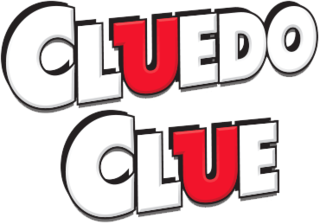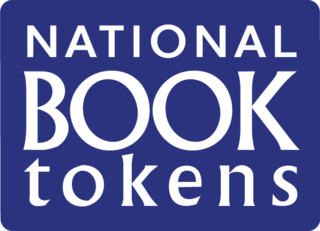Related Research Articles

Monopoly is a multiplayer economics-themed board game. In the game, players roll two dice to move around the game board, buying and trading properties and developing them with houses and hotels. Players collect rent from their opponents and aim to drive them into bankruptcy. Money can also be gained or lost through Chance and Community Chest cards and tax squares. Players receive a salary every time they pass "Go" and can end up in jail, from which they cannot move until they have met one of three conditions. House rules, hundreds of different editions, many spin-offs, and related media exist. Monopoly has become a part of international popular culture, having been licensed locally in more than 103 countries and printed in more than 37 languages. As of 2015, it was estimated that the game had sold 275 million copies worldwide. The original game was based on locations in Atlantic City, New Jersey, United States with the exception of Marven Gardens which is in adjacent Ventnor, NJ.

Cluedo, known as Clue in North America, is a murder mystery game for three to six players that was devised in 1943 by British board game designer Anthony E. Pratt. The game was first manufactured by Waddingtons in the United Kingdom in 1949. Since then, it has been relaunched and updated several times, and it is currently owned and published by the American game and toy company Hasbro.

A stored-value card (SVC) is a payment card with a monetary value stored on the card itself, not in an external account maintained by a financial institution. This means no network access is required by the payment collection terminals as funds can be withdrawn and deposited straight from the card. Like cash, payment cards can be used anonymously as the person holding the card can use the funds. They are an electronic development of token coins and are typically used in low-value payment systems or where network access is difficult or expensive to implement, such as parking machines, public transport systems, and closed payment systems in locations such as ships.

The Lord of the Rings Trading Card Game is an out-of-print collectible card game produced by Decipher, Inc. Released November 2001, it is based on Peter Jackson's The Lord of the Rings film trilogy and the J. R. R. Tolkien novel on which the films were based. Decipher also had the rights to The Hobbit novel but did not release any cards based on it. In addition to images taken from the films, in 2004 Weta Workshop produced artwork depicting characters and items from the novel absent from the films for use on cards. In 2002, LOTR TCG won the Origins Awards for Best Trading Card Game of 2001 and Best Graphic Presentation of a Card Game 2001. Decipher's license to The Lord of the Rings expired on July 30, 2007, after which all official promotion and distribution of the game stopped.

Exonumia are numismatic items other than coins and paper money. This includes "Good For" tokens, badges, counterstamped coins, elongated coins, encased coins, souvenir medallions, tags, wooden nickels and other similar items. It is an aspect of numismatics and many coin collectors are also exonumists.

A ticket machine, also known as a ticket vending machine (TVM), is a vending machine that produces paper or electronic tickets, or recharges a stored-value card or smart card or the user's mobile wallet, typically on a smartphone. For instance, ticket machines dispense train tickets at railway stations, transit tickets at metro stations and tram tickets at some tram stops and in some trams. Token machines may dispense the ticket in the form of a token which has the same function as a paper or electronic ticket. The typical transaction consists of a user using the display interface to select the type and quantity of tickets and then choosing a payment method of either cash, credit/debit card or smartcard. The ticket(s) are then printed on paper and dispensed to the user, or loaded onto the user's smartcard or smartphone.

A scrip is any substitute for legal tender. It is often a form of credit. Scrips have been created and used for a variety of reasons, including exploitative payment of employees under truck systems; or for use in local commerce at times when regular currency was unavailable, for example in remote coal towns, military bases, ships on long voyages, or occupied countries in wartime. Besides company scrip, other forms of scrip include land scrip, vouchers, token coins such as subway tokens, IOUs, arcade tokens and tickets, and points on some credit cards.

A gift card, also known as a gift certificate in North America, or gift voucher or gift token in the UK, is a prepaid stored-value money card, usually issued by a retailer or bank, to be used as an alternative to cash for purchases within a particular store or related businesses. Gift cards are also given out by employers or organizations as rewards or gifts. They may also be distributed by retailers and marketers as part of a promotion strategy, to entice the recipient to come in or return to the store, and at times such cards are called cash cards. Gift cards are generally redeemable only for purchases at the relevant retail premises and cannot be cashed out, and in some situations may be subject to an expiry date or fees. American Express, MasterCard, and Visa offer generic gift cards which need not be redeemed at particular stores, and which are widely used for cashback marketing strategies. A feature of these cards is that they are generally anonymous and are disposed of when the stored value on a card is exhausted.

The Wheel of Time Collectible Card Game is an out-of-print collectible card game published by Precedence Entertainment in December 1999 and based on Robert Jordan's The Wheel of Time fantasy novel series. The game was somewhat unusual among contemporary collectible card games because it required a play mat with tokens and customized six-sided dice to play. It uses some similar game mechanics to the Babylon 5 Collectible Card Game and the Tomb Raider Collectible Card Game, which were also published by Precedence.

Top Trumps is a card game first published in 1978. Each card contains a list of numerical data, and the aim of the game is to compare these values to try to trump and win an opponent's card. A wide variety of different packs of Top Trumps has been published.

A voucher is a bond of the redeemable transaction type which is worth a certain monetary value and which may be spent only for specific reasons or on specific goods. Examples include housing, travel, and food vouchers. The term voucher is also a synonym for receipt and is often used to refer to receipts used as evidence of, for example, the declaration that a service has been performed or that an expenditure has been made. Voucher is a tourist guide for using services with a guarantee of payment by the agency.
Coinstar, LLC is an American company operating coin-cashing machines.

In numismatics, token coins or trade tokens are coin-like objects used instead of coins. The field of token coins is part of exonumia and token coins are token money. Their denomination is shown or implied by size, color or shape. They are often made of cheaper metals like copper, pewter, aluminium, brass and tin, or non-metals like bakelite, leather and porcelain.

Tesco Clubcard is the loyalty card of British supermarket chain Tesco.
Labour vouchers are a device proposed to govern demand for goods in some models of socialism and to replace some of the tasks performed by currency under capitalism.

World Book Day is a charity event held annually in the United Kingdom and Ireland on the first Thursday in March. On World Book Day, every child in full-time education in the UK and the Republic of Ireland is provided with a voucher to be spent on books; the event was first celebrated in the United Kingdom in 1998.
A charity gift card allows a gift giver to make a charitable donation that the gift recipient may direct to the charity of their choice. Although a charity gift card has many similarities to a store gift card, a charity gift card functions quite differently. A charity gift card is an indicator of control over a small donor advised fund. The purchaser of the charity gift card creates the donor advised fund with the charity gift card purchase money. When the charity gift card recipient “spends” the gift card, the recipient is in actuality advising the holder of the associated donor advised fund to send the money to the charity that the charity gift card recipient selects.

Facebook Credits was a virtual currency that enabled people to purchase items in games and non-gaming applications on the Facebook Platform. One U.S. dollar was the equivalent of 10 Facebook Credits. Facebook Credits were available in 15 currencies including U.S. dollars, pound sterling, euros, and Danish kroner. Facebook was hoping eventually to expand Credits into a micropayment system open to any Facebook application, whether a game or a media company application. Facebook deprecated Credits in favour of users' local currencies.

National Book Tokens is a currency-backed voucher scheme, and successor to the book token programme, that is available in the UK and Ireland. They are solely owned and issued by Book Tokens Ltd.

The economics of Christmas are significant because Christmas is typically a high-volume selling season for goods suppliers around the world. Sales increase dramatically as people purchase gifts, decorations, and supplies to celebrate. In the U.S., the "Christmas shopping season" starts as early as October. In Canada, merchants begin advertising campaigns just before Halloween, and step up their marketing following Remembrance Day on 11 November. In the UK and Ireland, the Christmas shopping season starts from mid-November, around the time when high street Christmas lights are turned on. In the United States, it has been calculated that about one fifth of retail sales to one quarter of all personal spending takes place during the Christmas/holiday shopping season. Figures from the U.S. Census Bureau reveal that expenditure in department stores nationwide rose from $20.8 billion in November 2004 to $31.9 billion in December 2004, an increase of 54 percent. In other sectors, the pre-Christmas increase in spending was even greater, due to a November through December buying surge of 100% in bookstores and 170% in jewelry stores. In the same year employment in American retail stores rose from 1.6 million to 1.8 million in the two months leading up to Christmas. This means that while consumers might spend more during this season, they also are given increased employment opportunities as sales rise to meet the increased demand.
References
- ↑ Mangan, Lucy (2007-11-17). "An appreciation of a token". The Guardian . Retrieved 2007-12-25.